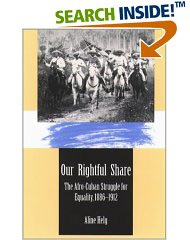

 |
AfroCubaWeb
|
 |
|

In Our Rightful Share, Aline Helg examines the issue of race in Cuban
society, politics, and ideology during the island's transition from a Spanish colony to an
independent state. She challenges Cuba's well-established myth of racial equality and
shows that racism is deeply rooted in Cuban creole society.
Helg argues that despite Cuba's abolition of slavery in 1886 and its winning of
independence in 1902, Afro-Cubans remained marginalized in all aspects of society. After
the wars for independence, in which they fought en masse, Afro-Cubans demanded change
politically by forming the first national black party in the Western Hemisphere. This
challenge met with strong opposition from the white Cuban elite, culminating in the
massacre of thousands of Afro-Cubans in 1912. The event effectively ended Afro-Cubans'
political organization along racial lines, and Helg stresses that although some cultural
elements of African origin were integrated into official Cuban culture, true racial
equality has remained elusive.
Our Rightful Share is the winner of 3 awards: the American Historical Association's and the Association of Caribbean Historians' awards. It just won the the 1998 Gordon K. Lewis Memorial Award from the Caribbean Studies Association, given "to an outstanding book that addresses a Pan-Caribbean problem issue."
Aline Helg served as advisor to Gloria Rolando on her feature film dealing with the Independents of Color and the 1912 massacre: "Roots of My Heart." She was also an advisor for the filming of 1912: Breaking the Silence (2010-2013), a documentary series whose production she helped finance.
It is fair to say that it was Aline Helg's book which launched the commemoration of 1912. Without her, it is not clear the Cubans would have been able to rescue this forgotten and repressed story in time for the 2012 commemoration.
Click for pricing & to order ==>
![]()
Review in the Latin America Resource Review, The African Experience in Latin America, Volume 2 Issue 2:
Aline Helg. University of North Carolina Press, 1995 Aline Helg examines the issue of race in Cuban society, politics, and ideology during the island's transition from a Spanish colony to an independent states. She challenges Cuba's well-established myth of racial equality and shows that racism is deeply rooted in Cuban Creole society. Helg argues that despite Cuba's abolition of slavery in 1886 and its winning of independence in 1902, Afro-Cubans have remained marginalized in all aspects of society. After the wars for independence in which they fought en masse, Afro-Cubans demanded change politically by forming the first national black party in the western hemisphere. This challenge met with strong opposition from the white Cuban elite, culminating in the massacre of thousands of Afro-Cubans in 1912. The event effectively ended the Afro-Cuban's political organization along racial lines, and Helg stresses that although some cultural elements of African origin were integrated into official Cuban culture, true racial equality has remained elusive.
Review at Trinity College
www.trincoll.edu/~jdivney/race.htm
|
Why did race not become an organizational category in Caribbean Colombia as it did in several other societies with significant African-descended populations? Helg argues that divisions within the lower and upper classes, silence on the issue of race, and Afro-Colombians' preference for individual, local, and transient forms of resistance resulted in particular spheres of popular autonomy but prevented the development of an Afro-Caribbean identity in the region and a cohesive challenge to Andean Colombia. Considering cities such as Cartagena and Santa Marta, the rural communities along the Magdalena River, and the vast uncontrolled frontiers, Helg illuminates an understudied Latin American region and reintegrates Colombia into the history of the Caribbean.
|
[AfroCubaWeb] [Site Map] [Music] [Arts] [Authors] [News] [Search this site]